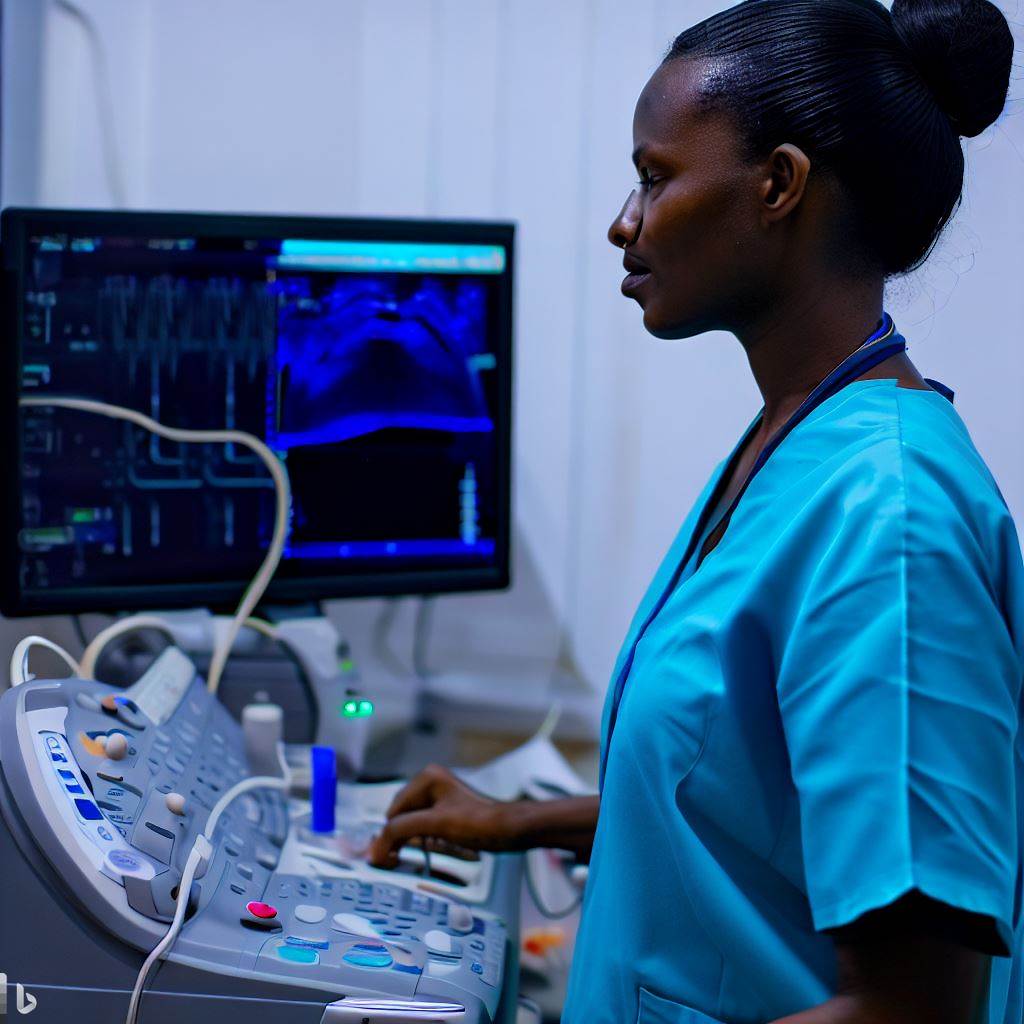Introduction
Midwifery is a crucial aspect of maternal health, involving the care and support of women throughout pregnancy, childbirth, and the postpartum period.
This blog post will focus on midwifery practices in Nigeria, highlighting the heroic efforts of midwives in improving maternal health outcomes in the country.
We will discuss the challenges faced by midwives, the importance of their work, and the impact they have on the lives of women and their families.
Read: Optometry in Nigeria: A Vision of Healthy Future
Challenges Faced by Midwives in Nigeria
Midwives in Nigeria are instrumental in providing maternal healthcare for women across the country. However, they face numerous challenges that make their work difficult and complex.
These challenges can be broken down into various factors that affect midwifery in Nigeria.
Lack of resources
- Midwives in Nigeria often lack the necessary resources to provide proper maternal healthcare.
- Hospitals and clinics frequently run low on supplies like drugs, equipment, and basic medical materials.
- In some cases, midwives are left without electricity, water, or even basic infrastructure.
- These issues make it difficult for midwives to do their jobs and provide adequate care to their patients.
Low pay
- Midwives in Nigeria are often paid very little for their work.
- Their salaries are often not commensurate with the amount of education and training they have received.
- This not only affects their own livelihood but can also lead to reduced motivation and lack of job satisfaction.
- The low pay also makes it difficult for medical centers to attract and retain qualified midwives.
Societal stigmas
- In Nigeria, there is a certain stigma attached to midwifery as a profession.
- Society often views midwifery as a stepping stone or inferior to other medical professions.
- The lack of recognition and respect can lead to midwives feeling undervalued and under-appreciated in their work.
- It also makes it difficult for midwives to speak up and advocate for their needs and the needs of their patients.
Lack of awareness and education among women
- Women in Nigeria may not be aware of the importance of maternal healthcare, leading to a lack of demand for midwifery services.
- Without public education campaigns, women may not realize the potential risks of childbirth and the need for trained professionals to assist them.
- Additionally, misinformation and cultural beliefs can impact a woman’s decision to seek proper maternal healthcare.
- Midwives must work to educate their patients and encourage demand for their services to improve maternal health outcomes in Nigeria.
Midwives in Nigeria face numerous challenges in their work, from lack of resources to societal stigmas.
However, despite these obstacles, midwives continue to provide vital support and care to mothers and their children.
To improve maternal health outcomes in Nigeria, efforts must be made to address these challenges and support midwives in their crucial work.
Read: Specialty Nursing Careers: Untold Stories of Nigeria
The Role of Midwives in improving maternal health in Nigeria
Midwifery is an essential profession that should be celebrated all over the world.
Midwives are important in the lives of women, especially during pregnancy, childbirth, and postpartum periods. Nigeria has a vast community of midwives who play a significant role in maternal health.
In this blog chapter, we shall discuss the significance of midwives in maternal healthcare, the positive impact they have made in Nigeria, particularly in rural areas where access to healthcare is limited.
Significance of Midwives in Maternal Healthcare
- Midwives provide prenatal care and education to pregnant women.
- They monitor and assess the mother and child’s health during pregnancy.
- Midwives provide counselling and support during labour and childbirth.
- Midwives provide breastfeeding support and education to new mothers.
- They conduct routine check-ups and assessments on mother and child after delivery.
- Midwives educate women on family planning and reproductive health.
- They provide emotional support and guidance to women during their reproductive years.
The above signified the importance of midwives in maternal healthcare. Without midwives, many women would lack access to the care, support, and education they need during pregnancy, labour, and delivery.
The Positive Impact Midwives Have Made in Nigeria
Midwives have made a tremendous impact on maternal health in Nigeria. In many rural areas, where access to healthcare is limited, midwives have become the primary source of maternal healthcare services. Here are some notable positive impacts that midwives have made in Nigeria:
- Midwives provide cost-effective healthcare services to women in rural areas.
- They have helped to reduce maternal mortality rates in Nigeria by providing essential care during pregnancy, childbirth, and postpartum periods.
- Midwives are working tirelessly to improve maternal and child health by providing education on healthy living, disease prevention, and safe motherhood practices.
- Midwives provide essential care to women who would otherwise have no access to healthcare due to a lack of resources and infrastructure.
- They have helped to increase the number of skilled births in Nigeria, which has contributed to a reduction in infant and maternal deaths.
- Midwives play a pivotal role in health promotion, disease prevention, and healthcare management, especially in rural areas.
- They work in collaboration with other healthcare professionals to provide comprehensive and quality maternal healthcare services to women.
The above positive impact made by midwives has enhanced and improved maternal health in Nigeria, thereby saving lives and building a better future for women and their families.
Overall, midwives play a vital role in maternal health. In Nigeria, midwives have contributed significantly to maternal health by providing essential healthcare services and education to women, especially in rural areas.
They are unsung heroes who work tirelessly to ensure that women receive the best care possible during pregnancy, childbirth, and postpartum periods. Thus, the role of midwives in improving maternal health in Nigeria cannot be overemphasized.

Read: The Path to Becoming a Surgeon in Nigeria
You Might Also Like: The Importance of Psychology in Nigeria’s Development
Profile of some of Nigeria’s notable midwives
Midwifery is a noble profession that requires skill, passion, and dedication. It takes a special kind of person to be a midwife, especially in a country like Nigeria, where maternal mortality rates are still high. Here are some of Nigeria’s most skilled and passionate midwives:
Mrs. Felicia A. Oguntoyinbo
Mrs. Oguntoyinbo is a retired midwife who has dedicated her life to improving maternal health in Nigeria. She started her career in the early 1970s and worked in various public and private health institutions across Nigeria.
She played a significant role in the establishment of the Nigerian Midwives Association and mentored many midwives during her career. Her contributions to midwifery in Nigeria have been invaluable.
Mrs. Grace Adejuwon
Mrs. Adejuwon is a highly skilled midwife who has worked in both public and private health institutions in Nigeria. She has delivered thousands of babies and saved countless lives during her career.
She is passionate about maternal health and has been actively involved in the training and mentoring of young midwives. Her dedication to her profession has earned her several accolades and awards.
Mrs. Ayoka Lawani
Mrs. Lawani is a midwife with over 30 years of experience in the field. worked in both urban and rural communities and has delivered babies in the most challenging of circumstances.
She is a strong advocate for maternal health and has contributed to the development of policies and programs aimed at improving maternal and child health in Nigeria. She has also trained and mentored many young midwives.
Mrs. Fatima Abdulaziz
Mrs. Abdulaziz is a midwife who has dedicated her career to improving maternal health in northern Nigeria, where maternal mortality rates are among the highest in the country.
She has worked in both public and private health institutions and has played a significant role in the training and mentoring of midwives in the region.
She is passionate about ensuring that every woman in northern Nigeria has access to quality maternal healthcare.
Mrs. Bisi Taiwo
Mrs. Taiwo is a midwife with over 20 years of experience in the field. Also worked in various public and private health institutions across the country and has delivered thousands of babies.
Passionate about maternal health and has been actively involved in the training and mentoring of young midwives. Also contributed to the development of policies aimed at improving maternal and child health in Nigeria.
Mrs. Bose Adeniran
Mrs. Adeniran is a highly skilled midwife who has worked in both public and private health institutions in Nigeria.
She has played a significant role in the training and mentoring of midwives and has contributed to the development of policies aimed at improving maternal and child health in Nigeria. She has also delivered thousands of babies and has saved countless lives during her career.
Mrs. Folorunso Alafe
Mrs. Alafe is a midwife with over 25 years of experience in the field. Worked in various public and private health institutions across Nigeria and has delivered thousands of babies.
She is passionate about maternal health and has been actively involved in the training and mentoring of young midwives. She has also contributed to the development of policies aimed at improving maternal and child health in Nigeria.
These midwives are just a few examples of the many skilled and passionate midwives in Nigeria who are working tirelessly to improve maternal health in the country.
Their dedication to their profession is an inspiration to us all, and we should all be grateful for their contributions to the health and wellbeing of mothers and babies in Nigeria.
Read: Top Institutions to Study Phlebotomy in Nigeria
The Future of Midwifery in Nigeria
Midwives play an essential role in maternal healthcare in Nigeria.
They bridge the gap between traditional birth attendants and obstetricians, providing critical care and support to mothers during pregnancy, labor, and postpartum.
However, midwifery in Nigeria has faced significant challenges in the past, including inadequate education and training, poor working conditions, and limited resources. Nevertheless, there is hope for the future of midwifery in Nigeria.
The Changing Landscape of Maternal Healthcare in Nigeria
- Maternal health in Nigeria has improved in recent years, but there is still a long way to go to meet international targets.
- The maternal mortality ratio in Nigeria remains high, at 512 per 100,000 live births, according to the World Health Organization.
- The Nigerian government has launched a number of initiatives to improve maternal healthcare, including the midwives service scheme.
- This scheme aims to provide skilled birth attendants, including midwives, to rural and underserved areas of Nigeria.
- There has also been an increased focus on community-based care and improving the quality of care provided by midwives.
The Potential for Growth and Advancement in Midwifery in Nigeria
- There is a growing recognition of the importance of midwifery in Nigeria, with more resources being invested in midwifery education and training.
- Only 30% of Nigerian midwives have received formal training, according to a report by the United Nations Population Fund.
- The Nigerian government has set a target of training 20,000 midwives by 2030 to address this shortage.
- Midwives in Nigeria are also increasingly being recognized as autonomous practitioners, able to provide care independently of doctors and other healthcare professionals.
- This recognition of the role of midwives in maternal healthcare has the potential to improve access to quality care for mothers across Nigeria.
How Midwifery Can Further Improve Maternal Health in Nigeria
- Midwives can provide holistic care to mothers, including emotional and psychological support, which can improve maternal health outcomes.
- They can also provide culturally sensitive care that respects the beliefs and practices of the communities they serve.
- Midwives can play a critical role in preventing maternal deaths by identifying and managing complications during pregnancy and childbirth.
- They can also promote maternal and child health through education and counseling, encouraging healthy behaviors among mothers and families.
- The role of midwives in Nigeria needs to be further supported through adequate resources, including equipment, supplies, and staffing, to ensure that they can provide high-quality care.
The future of midwifery in Nigeria is bright, but there is still work to be done to ensure that every mother and child has access to quality care.
The changing landscape of maternal healthcare in Nigeria presents new opportunities for midwives, but also new challenges.
It is essential that midwifery education and training is strengthened, and that midwives are supported to provide the highest standard of care possible.
By investing in midwifery in Nigeria, we can ensure that every mother and child has the best possible chance of a healthy and happy life.
Read: Inside the Life of General Practitioners in Nigeria
Conclusion
Finally, midwifery in Nigeria remains a crucial aspect of maternal healthcare.
The heroes in the field of midwifery have worked tirelessly to ensure that expectant mothers receive proper care before, during, and after delivery.
These midwives have significantly contributed to improving maternal health in Nigeria.
We must do more to ensure skilled midwifery care is accessible to every expectant mother in Nigeria.
The continued support of midwives in Nigeria is imperative to saving the lives of mothers and newborns.
Therefore, it is vital for all readers to support the work of midwives in Nigeria. This support can come in the form of donations, volunteering, or raising awareness of the crucial role that midwives play in maternal healthcare.
Together, we can ensure that every expectant mother in Nigeria has access to safe and quality midwifery care.




